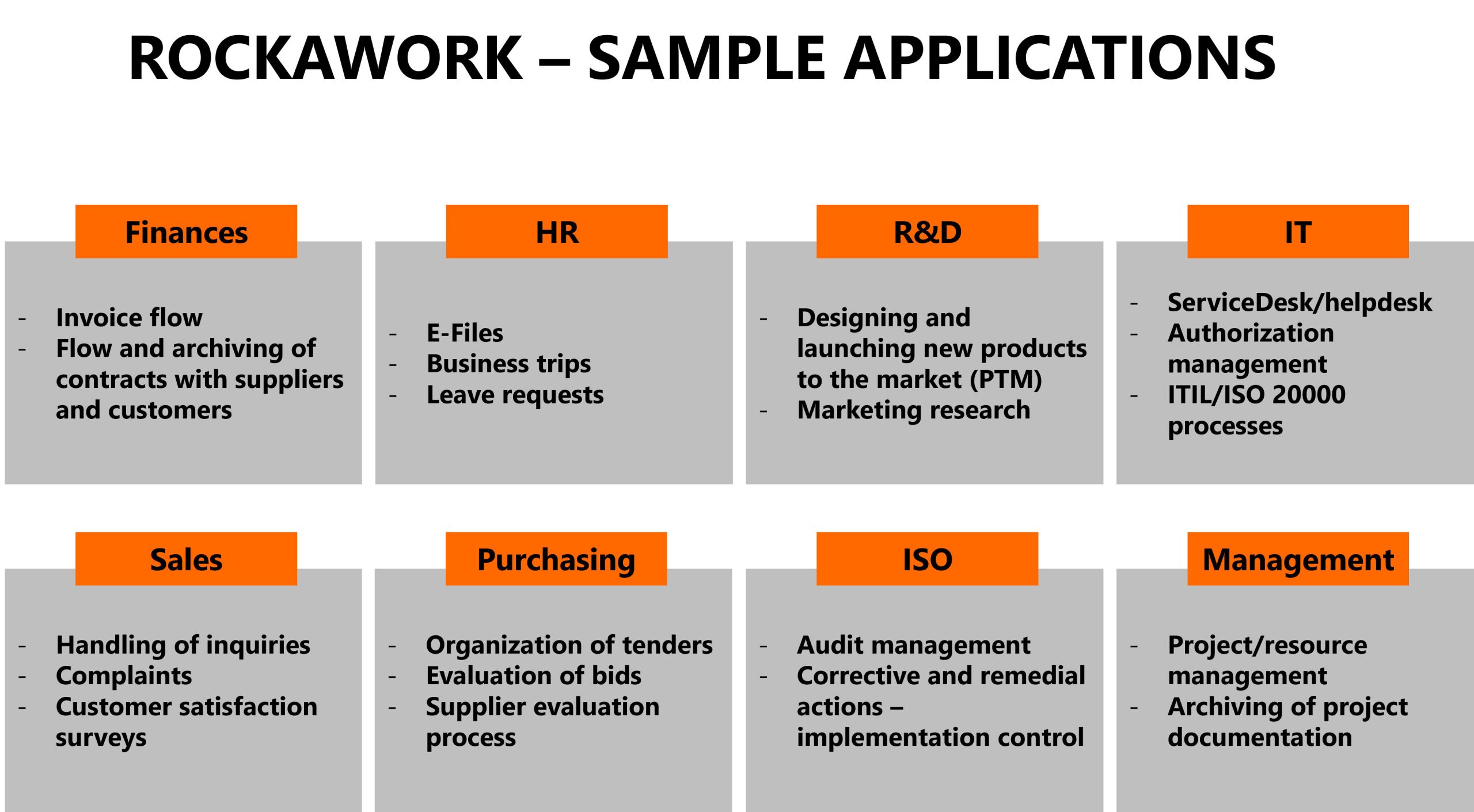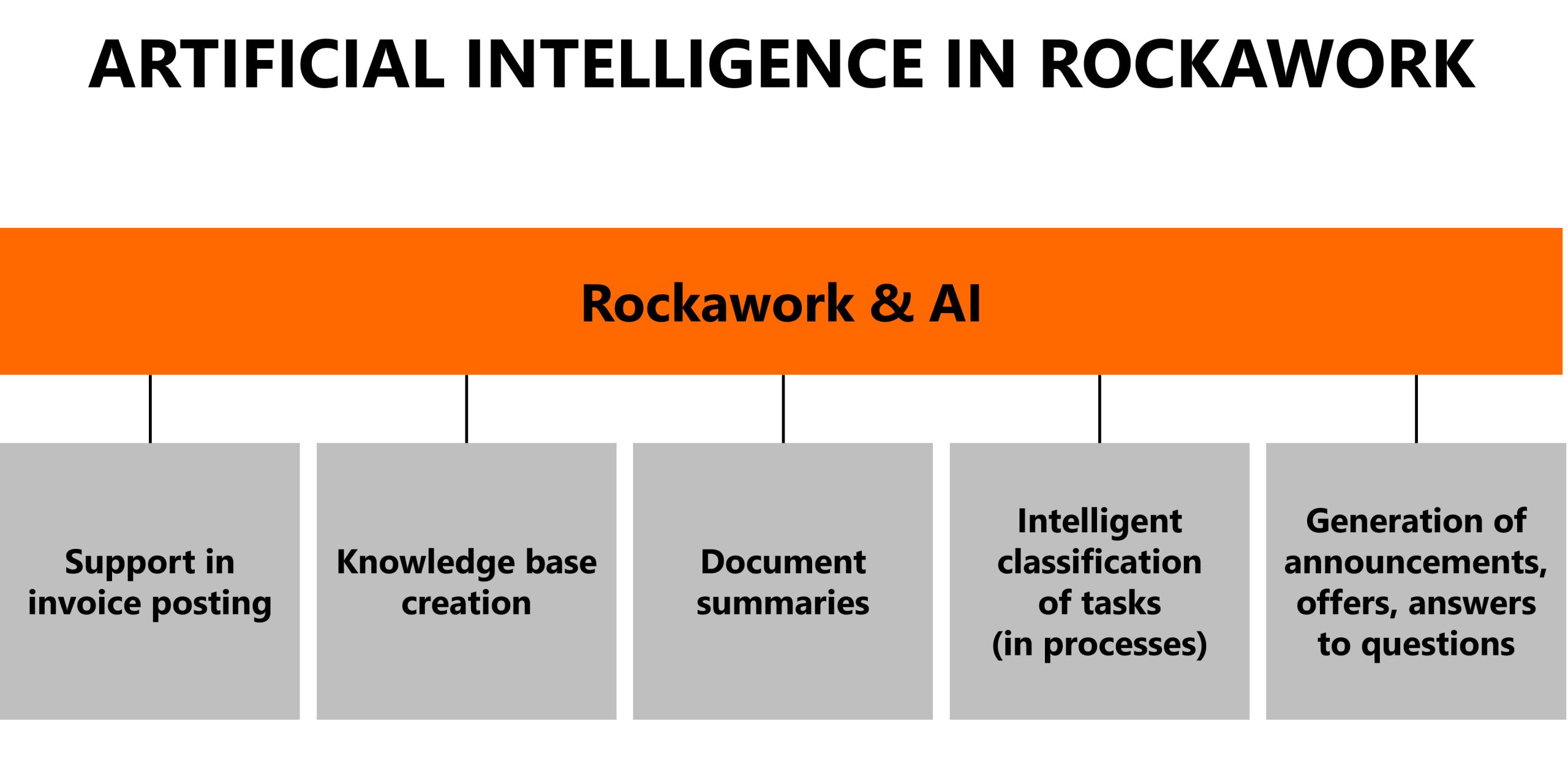
Rockawork – digitalization 2.0
AI-assisted process automation
The capabilities of artificial intelligence are fascinating. At All for One Poland, we are working on solutions that translate the dormant potential of these tools into streamlining and automating specific business processes. One of the tools that already allows our clients to accelerate and simplify their work through the use of AI, thus gaining measurable benefits, is the Rockawork platform (formerly known as All for One ECM), which is widely used in various business areas.
The capabilities of artificial intelligence are fascinating. At All for One Poland, we are working on solutions that translate the dormant potential of these tools into streamlining and automating specific business processes. One of the tools that already allows our clients to accelerate and simplify their work through the use of AI, thus gaining measurable benefits, is the Rockawork platform (formerly known as All for One ECM), which is widely used in various business areas.
Rockawork (formerly known as All for One ECM) is a low-code platform that is intuitive for end users. It allows for document schema creation, process modeling in BPMN notation, report creation and other advanced tasks. With these features and easy adaptability, the solution is applicable to a wide range of processes and business areas.
The long-known applications of the Rockawork platform can now be enhanced with new features that make it much easier for users to work with the tool and allow for easy digitalization of processes that were previously impossible to automate. This is made possible by incorporating artificial intelligence tools based on large language models.
Legal aspects of using AI
The use of AI tools is regulated by legal acts aimed at protecting people and their data. These laws are essential for the application of artificial intelligence in business, making it important to be well-informed about them. In March 2024, the AI Act was adopted in the European Union. It restricts the use of artificial intelligence in several areas where it poses unacceptable risks to people, including:
- Cognitive behavioral manipulation of individuals or specific vulnerable groups (e.g., voice-activated toys encouraging dangerous behaviors);
- Biometric identification and categorization of individuals;
- Scoring of citizens: classification based on socio-economic status, behaviors, or personal characteristics.
The same legal act stipulates that the use of generative artificial intelligence, such as large language models (e.g., ChatGPT), is permitted. However, we must keep in mind that we are still bound by the GDPR regulations. This means that AI tools may not be used if the documents we want to share with services like ChatGPT contain personal data (be cautious with CVs, documents exchanged with contractors, or invoices).
The All for One Poland solutions that we present to our clients do not use language models and features that are outside the European Union, and they are compliant with GDPR.
Rockawork and AI – in invoice posting
The flow and approval of purchase invoices is one of the most common applications of the Rockawork platform among our clients. In short, an invoice that arrives at the company via email, scan, or in the future through KSeF, is sent to OCR where the data is extracted. Then the approval process is launched and posting is made in the ERP system.
AI solutions are used in the approval process and communication with the ERP, in assigning the appropriate accounts in the accounting process to the invoice items based on orders. Until recently, a common problem was the difference in product descriptions between the order and the seller’s invoice (e.g., a black pen in the order would become a black fineliner in the invoice), making the automation of this task nearly impossible.
The implemented language models allow for matching differently named items in the invoice to the items in the order and linking these documents in the system (in other words, AI recognizes that the black pen in the order is the same as the black fineliner in the invoice) This application will help support the work of accountants and free them from the time-consuming task of reviewing and matching these documents.
In companies that use the SAP system, similar functionality can be implemented directly in this system (MIRO transaction). A button will appear on the SAP screen for the initial posting, which will only require validation and approval.
What about a situation where it is necessary to assign the appropriate accounts required in the posting process to invoice items when there are no orders and requisitions? Traditionally, in such situations, accountants usually have descriptive accounting instructions (e.g., invoices from EU countries should be posted to the main account X, invoices from the US – to account Y, from Poland – to account Z). Digitalizing this process is hampered by different country names used in different languages. The artificial intelligence module in Rockawork excels in recognizing country names in any language and posting an invoice correctly. This simple example highlights the capabilities inherent in AI tools.
Algorithms based on a similar principle – instructions for AI such as “fill the main account field for invoices from company ABC with number 123" or “if… then…" – enable accurate posting according to implemented accounting instructions. These simple algorithms in natural language replace complex algorithms in traditional programming languages. At the end of the process, the employee just has to verify the correctness and give an approval. This results in significant time savings in preparing and implementing automation in the invoicing process.
Searching for information
Another example of the use of artificial intelligence in ECM processes is the search for information and the use of knowledge stored in the company without having to open and search documents. The virtual assistant itself searches the documents attached to Rockawork and answers the questions the user asks it in the chat window. The chat window can be added to various pages within the organization (e.g., on the company’s intranet).
This functionality can be used in many different ways, such as helping employees search for HR information, information about benefits offered and bonus rules, find information contained in various types of instructions and descriptions. Such a chat can be especially helpful for new employees during the onboarding process. They can ask the virtual assistant questions that will help them find their way around the new company – literally (“where is the canteen?") and figuratively (“how to report an absence?", “how to apply for a social benefits fund?"). A chat conversation can be conducted just like with a human (using context) without the need to formulate questions according to a specific scheme.
In this case, the Rockawork platform can serve as a backend system, which is a collection of documents to be searched by AI.
Content analysis
Analyzing the content of documents according to set parameters is also a task that AI can do for us. A good example of this is the initial analysis and selection of CVs sent to the email inbox and tagging people who meet the given criteria (e.g., a category B driving license, a forklift license, a level of language proficiency).
The criteria provided by the user are described with simple verbal commands specifying what information is important to us and how, on the basis of which criteria a possible evaluation is to be made (e.g. a foreign language proficiency level).
In most cases, AI excels at understanding the context and inflections of the Polish language, which not only allows it to understand the questions well, but also to give correct, comprehensible answers. The offers selected in this way are submitted for further processing. And for rejected candidates, AI will help us prepare a personalized response, e.g. with information about the reasons for disqualification.
The above capabilities can also be applied to the analysis of documents from the contract repository (e.g., the question: “are there non-competition provisions in the contract with company X"), quick assistance in the use of company systems and applications (e.g. “what does it mean when a field is marked in yellow? And in red?"). We are limited here only by our imagination.
Simple instructions for AI, such as “fill in the process variable first name – candidate’s first name, surname – candidate’s surname" or “fill in the education variable with the value primary, secondary or higher education", replacing code snippets prepared by a programmer, exemplify the practical application of the “low-code" principle, i.e. as little coding, programmer’s work as possible in favor of flexible creation of document schemas and definition of business processes in a visual way. In addition, it is worth noting that traditional code would not be able to cope with many such tasks that require “intelligence", contextual thinking, association. The business logic (algorithms) developed in this way can be descriptively introduced into the Rockawork platform using large language models and generative artificial intelligence.
Of course, the examples of artificial intelligence applications described above in the Rockawork platform do not cover all the capabilities of the tool. However, they allow us to grasp the scale of automation and facilitation that can be introduced in various areas of an organization.
Time savings, support for employees in handling their daily tasks or HR matters, easy access to knowledge while ensuring compliance with legal regulations (e.g., GDPR), are the key benefits of our solution.


